人教英语必修一同课异构课件:Unit 2 English around the world Section B Language Points(共42张PPT)
文档属性
| 名称 | 人教英语必修一同课异构课件:Unit 2 English around the world Section B Language Points(共42张PPT) |  | |
| 格式 | zip | ||
| 文件大小 | 833.6KB | ||
| 资源类型 | 教案 | ||
| 版本资源 | 人教版(新课程标准) | ||
| 科目 | 英语 | ||
| 更新时间 | 2015-01-07 15:39:01 | ||
图片预览

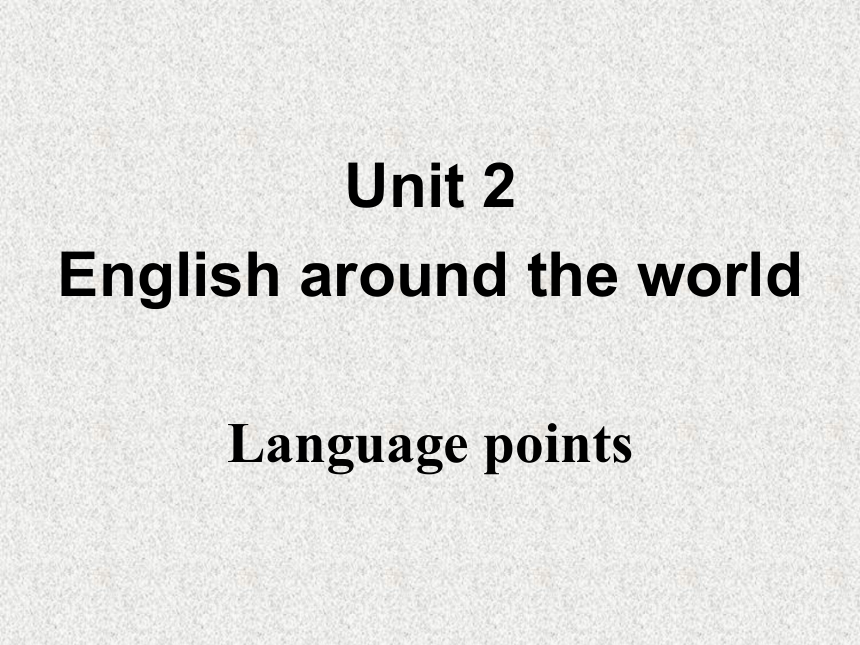
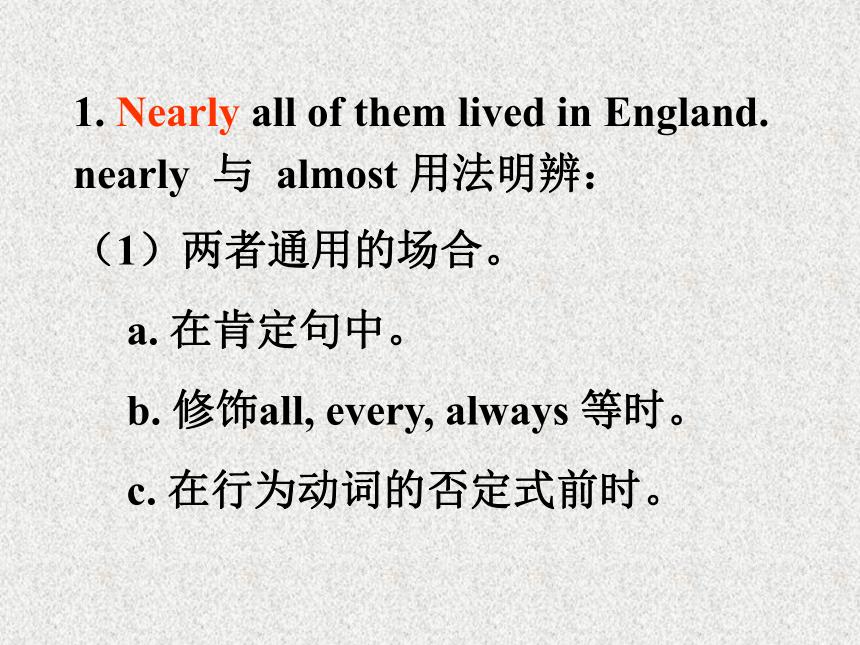
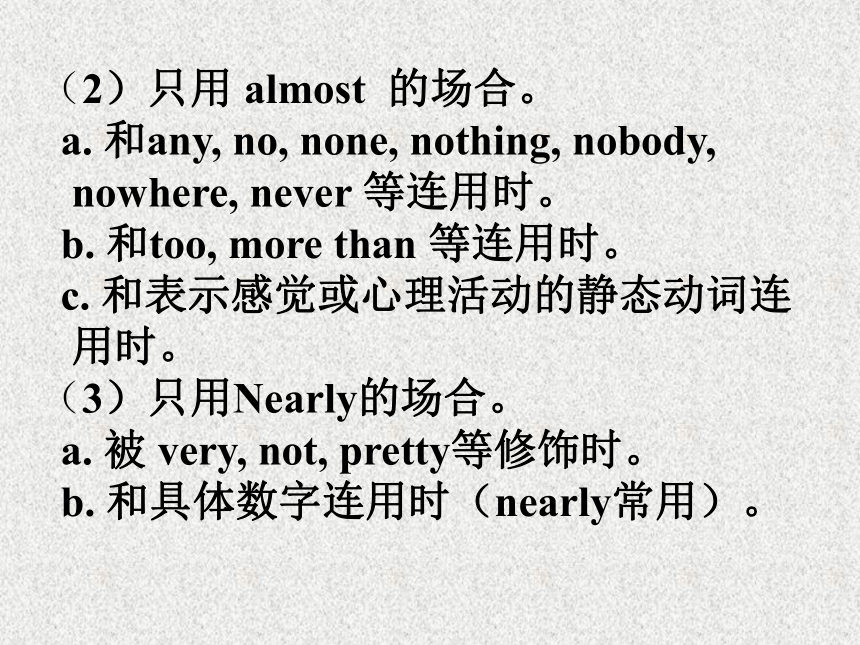
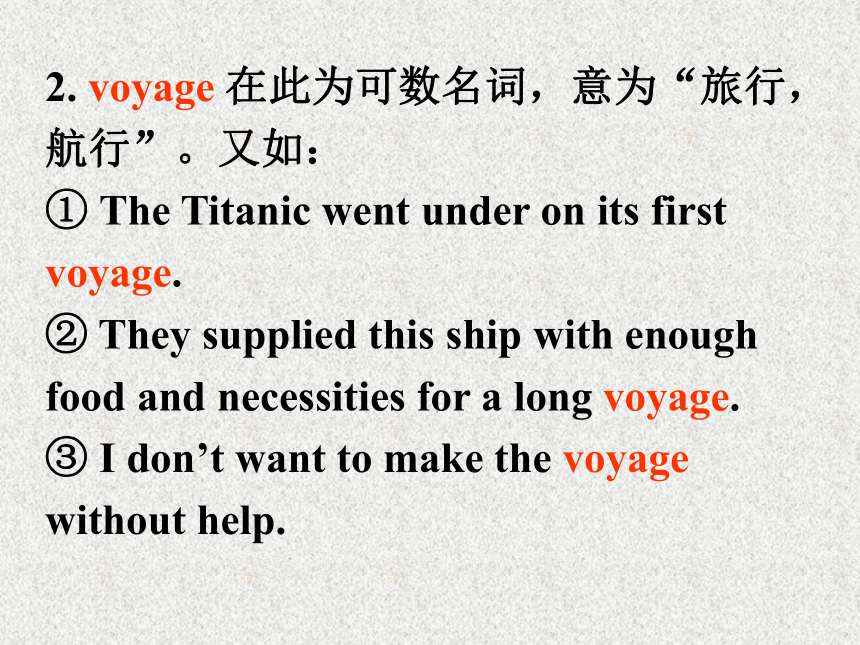
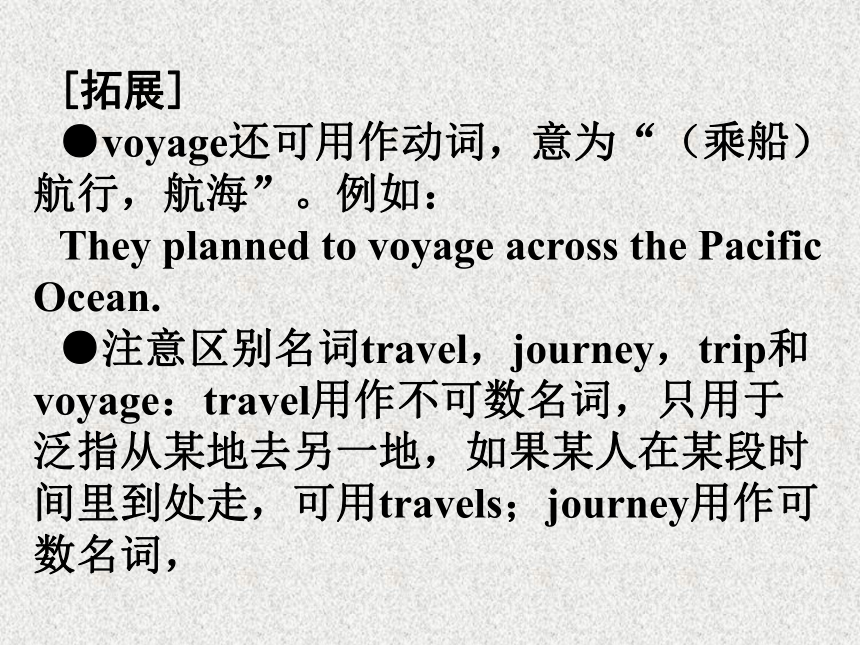
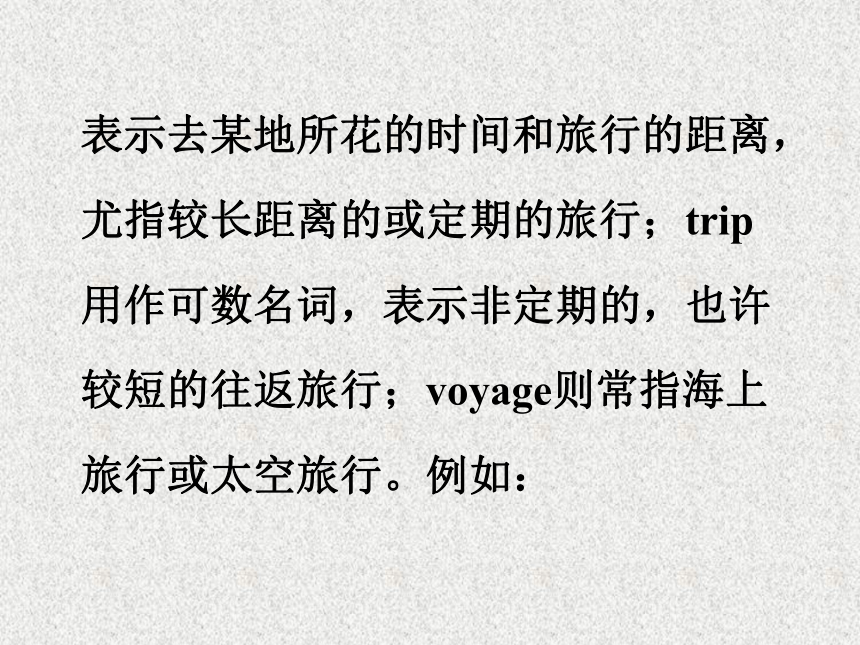


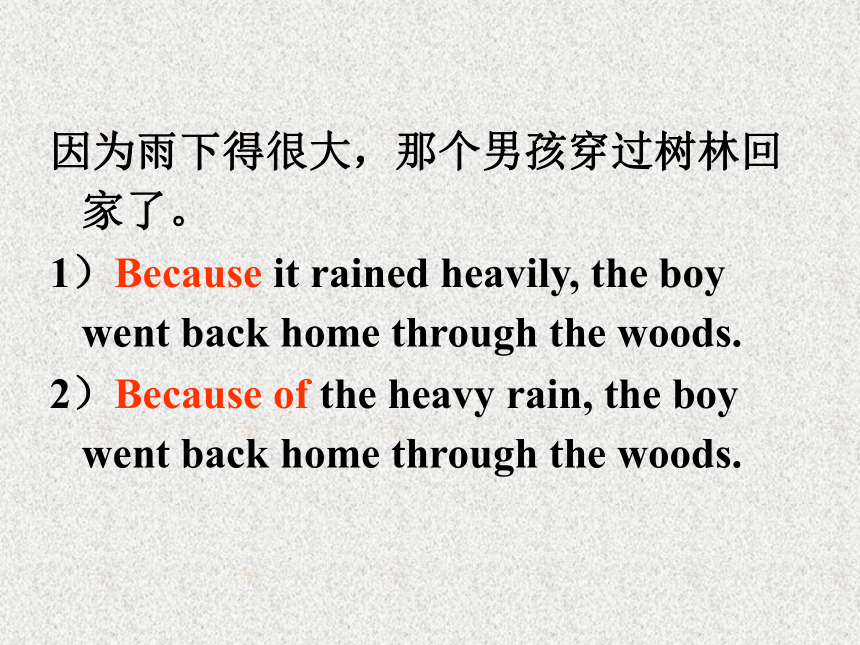
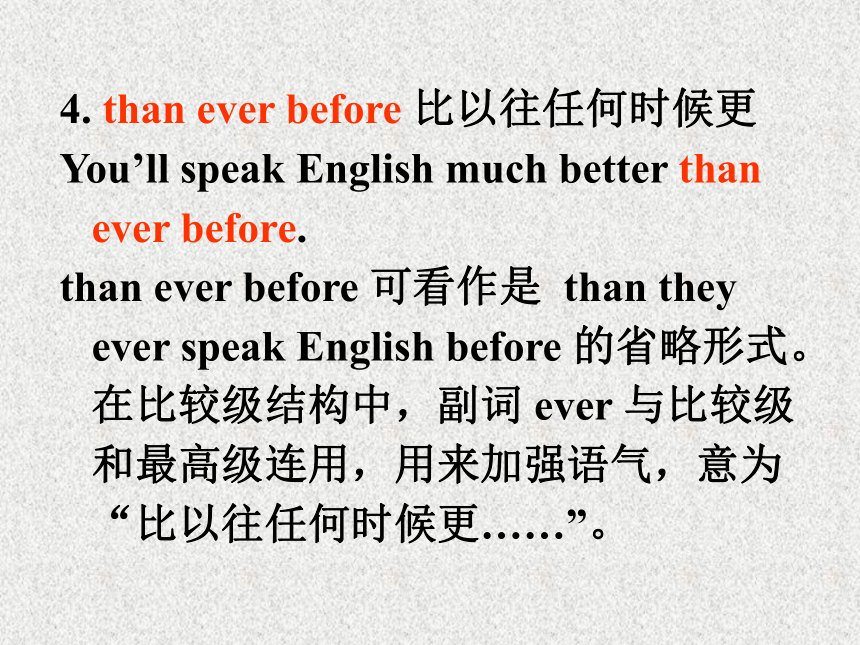
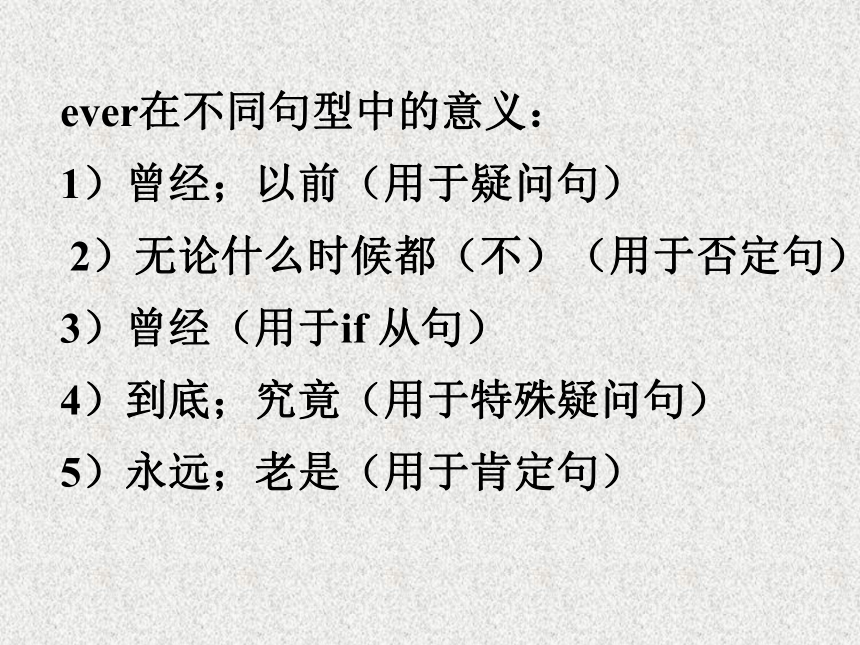
文档简介
课件42张PPT。Unit 2 English around the worldUnit 2
English around the world
Language points 1. Nearly all of them lived in England.
nearly 与 almost 用法明辨:
(1)两者通用的场合。
a. 在肯定句中。
b. 修饰all, every, always 等时。
c. 在行为动词的否定式前时。(2)只用 almost 的场合。
a. 和any, no, none, nothing, nobody, nowhere, never 等连用时。
b. 和too, more than 等连用时。
c. 和表示感觉或心理活动的静态动词连用时。
(3)只用Nearly的场合。
a. 被 very, not, pretty等修饰时。
b. 和具体数字连用时(nearly常用)。2. voyage 在此为可数名词,意为“旅行,航行”。又如:
① The Titanic went under on its first voyage.
② They supplied this ship with enough food and necessities for a long voyage.
③ I don’t want to make the voyage without help.[拓展]
●voyage还可用作动词,意为“(乘船)航行,航海”。例如:
They planned to voyage across the Pacific Ocean.
●注意区别名词travel,journey,trip和voyage:travel用作不可数名词,只用于泛指从某地去另一地,如果某人在某段时间里到处走,可用travels;journey用作可数名词,表示去某地所花的时间和旅行的距离,尤指较长距离的或定期的旅行;trip用作可数名词,表示非定期的,也许较短的往返旅行;voyage则常指海上旅行或太空旅行。例如:① Air travel is becoming cheaper.
② He’s on his travels again.
③ Lily had a long and difficult journey through the mountains last year.
④ The kids are going on a trip to the castle.3. because & because of
因为你的关心,我发现生活充满了希望。
1)Because you are concerned about me, I find that life is full of hope.
2)Because of your concern, I find that life is full of hope.因为雨下得很大,那个男孩穿过树林回家了。
1)Because it rained heavily, the boy went back home through the woods.
2)Because of the heavy rain, the boy went back home through the woods.
4. than ever before 比以往任何时候更
You’ll speak English much better than ever before.
than ever before 可看作是 than they ever speak English before 的省略形式。在比较级结构中,副词 ever 与比较级和最高级连用,用来加强语气,意为“比以往任何时候更……”。 ever在不同句型中的意义:
1)曾经;以前(用于疑问句)
2)无论什么时候都(不)(用于否定句)
3)曾经(用于if 从句)
4)到底;究竟(用于特殊疑问句)
5)永远;老是(用于肯定句)
5. Native English speaker can understand each other even if they don’t speak the same kind of English.
(1) even if ( = even though ): in spite of the fact; no matter whether 即使;尽管
是连词词组,用来引导让步状语从句;若主、从句皆表示将来情况,从句中可用一般现在时代替将来时。 后面既可用陈述语气,也可用虚拟语气。
Even if it rains tomorrow, we will leave for Beijing.
观察下面句子:
1. Even if I had money, I wouldn’t buy it.
2. If I had money, I would buy it.
3. It looks as if it is going to rain.
even if 引导让步状语从句;if 引导条件状语从句; as if/ though 似乎是, 引导方式状语从句。(2) even if 从句所说的不那么肯定。
even though 从句是事实。
Even if he is poor, she loves him.
(=He may be poor, yet she loves him.)
( Even ) though he is poor, she loves him.
( = He is poor, yet she loves him.)①A child came up to me and showed me the way to the station.
②The sky was dark blue and clear when the moon came up.
③Your question came up at the meeting.
come about 出现;发生
come across 偶然遇到或找到6. come up走近,上来升起被提出讨论come around 恢复;还原;改变某人的意见或立场
come down 传承;按习惯通过或处理
come out 成为众所周知;发行或发表;结果;自己公开宣布
come over 过来;偶然拜访
come up with 宣布或发现
The doctor came up with a cure for the disease.7. It was based more on German than the English we speak at present.
当时的英语更多的是以德语为基础的,而现代英语不是。
base (v.) 意为“以……为根据,把基地设在……”,常构成短语base sth. on/upon sth。又如:1. This novel is based on fact.
这部小说是以事实为根据的。
2. The paper had intended to base itself in London.
3. This film is based on a novel by D. H. Lawrence.[拓展]
●base还可用作名词,意为“底部,基地,基础”等。例如:
① There is a door at the base of the tower.
② How many military bases are they maintaining on foreign soil?
③ Many languages have Latin as their base.●掌握base构成的两个短语:
be off base意为“完全错误,大错特错”;
touch base (with) sb意为“(跟某人)联系上,逗留”。8. present1) 当前的, 现在的 (作前置定语)
Did you see the present national leaders?
Can you tell us something about the present
situation?
2) 出席的, 在场的(作表语或后置定语)
Our teacher was present at the meeting.
All the people present agree to my plan. n. 目前, 现在; 礼物
I can’t spare time because I am busy at present.
What present did you receive from your parents?
vt. 赠与, 赠给予present sth to / with sb
Mother presented a gift to me just now.at present: now; at this time, at this moment
She’s busy at present and can’t speak to you. 她现在很忙,不能跟你谈话。
2) At present he is a professor of mathematics at Cambridge.
目前他是剑桥大学的数学教授。9. Shakespeare made use of a wider vocabulary than ever before.
莎士比亚使用了比以往任何时候更为广泛的词汇量。
make (good/full/no…) use of 使用
1. We could make good use of our resources.
2. Every minute should be made good use of. 3. She makes use of people she meets as heroes for her novel.
4. We should make good use of time to study.
[拓展]
make构成的常见短语:make of,make from 通常用于被动语态,构成be made of,be made from 都表示“由……制成”,其中be made of 表示在产品中能够看出原材料;be made from 表示在产品中看不出原材料;make up 编写;编造;和解;make up of 由……组成/构成;make up for 弥补,补偿;make out理解,弄懂;看清,(勉强)辨认出;假装,装成;make into 制成……;make it成功,办成;及时赶到10. the number of/ a number of
the number of “…….的数目“,接可数名词复数,作主语时谓语动词用单数。
The number of undergraduates has increased over the years.
a number of 许多 大量 (后接复数名词),此短语加复数名词在句中做主语时,谓语动词用复数。( a great number of / a large number of / a small number of )
A number of teachers are on leave.The number of people invited _____
fifty, but a number of them ___ absent
for different reasons.
A. were; was B. was; was
C. was ; were D. were; wereC只能修饰可数名词的:
a large/ great/ good number of,
a good/ great many, dozens of, scores of, quite a few 只能修饰不可数名词的:
a great deal of, a large amount of,
quite a little, a large sum of 既可修饰可数也可修饰不可数名词的:
plenty of, a lot of, lots of,
a large quantity of 11. such as & for example such as 用来列举事物时, 一般列举同类人或事物中的几个例子且所列举事物的数量不能等于它前面所提到的总和, 一旦相等,要用that is 或namely.
I have three good friends, such as John, Jack and Tom. ×for example: 用来举例说明某一论点或情况, 一般只举同类人或物中的 “一个” 为例, 作插入语,可位于句首, 句中或句尾, 通常与所给的例子用逗号隔开. 其后的例子可以是从句.He can speak four languages such as English and French.
Ball games, for example, have spread around the world.用such as, for example, namely? 填空
Students , _______ Tom and Mary, should be learnt from.
(2) Wear something simple, __________, a skirt and blouse.
(3) He knows six languages, ________ Chinese, French, English, Spanish, Russian and Portuguese.such asfor examplenamely12. Only time can tell 惟有时间将能证明。
tell 此处用作不及物动词,意为“显示出”,还可作“发生影响;起作用;判断”等讲。
tell A from B: 区分,分别
Can you tell Tom from his twin brother?13. frequently是副词,意为“经常地,频繁地”。又如:
① He was frequently drunk.
② Stores of grain are frequently attacked by pests.[拓展]
●frequently的形容词是frequent,意为“经常的,频繁的”。例如:
① He is a frequent visitor to our house.
②Her headaches are becoming less frequent.
●frequent还可用作动词,意为“常到,常去”。例如:① The bar was frequented by actors from the nearby theatre.
② These woods are frequented by all kinds of birds.14. play a role / part ( in )
在……中担任角色;在……中起作用。
take (on) /perform a role 扮演角色,hand out roles 分派任务(角色)
a leading/starring role 主角
He filled the role of a manager.
The UN plays an important role in international relations.
She’s been offered a leading role in a new film. His parents played a part in his success.
他的成功有他父母的因素在内。
Her suggestions play a very important part in our decision-making. 她的建议在我们的决定中起了很重要的作用。
He has played all kinds of roles in his life.
他一生中扮演了各种各样的角色。Homework1. Try to remember the English meaning of the new words and expressions.
2. Finish the exercises 1 and 2 on page 49.
English around the world
Language points 1. Nearly all of them lived in England.
nearly 与 almost 用法明辨:
(1)两者通用的场合。
a. 在肯定句中。
b. 修饰all, every, always 等时。
c. 在行为动词的否定式前时。(2)只用 almost 的场合。
a. 和any, no, none, nothing, nobody, nowhere, never 等连用时。
b. 和too, more than 等连用时。
c. 和表示感觉或心理活动的静态动词连用时。
(3)只用Nearly的场合。
a. 被 very, not, pretty等修饰时。
b. 和具体数字连用时(nearly常用)。2. voyage 在此为可数名词,意为“旅行,航行”。又如:
① The Titanic went under on its first voyage.
② They supplied this ship with enough food and necessities for a long voyage.
③ I don’t want to make the voyage without help.[拓展]
●voyage还可用作动词,意为“(乘船)航行,航海”。例如:
They planned to voyage across the Pacific Ocean.
●注意区别名词travel,journey,trip和voyage:travel用作不可数名词,只用于泛指从某地去另一地,如果某人在某段时间里到处走,可用travels;journey用作可数名词,表示去某地所花的时间和旅行的距离,尤指较长距离的或定期的旅行;trip用作可数名词,表示非定期的,也许较短的往返旅行;voyage则常指海上旅行或太空旅行。例如:① Air travel is becoming cheaper.
② He’s on his travels again.
③ Lily had a long and difficult journey through the mountains last year.
④ The kids are going on a trip to the castle.3. because & because of
因为你的关心,我发现生活充满了希望。
1)Because you are concerned about me, I find that life is full of hope.
2)Because of your concern, I find that life is full of hope.因为雨下得很大,那个男孩穿过树林回家了。
1)Because it rained heavily, the boy went back home through the woods.
2)Because of the heavy rain, the boy went back home through the woods.
4. than ever before 比以往任何时候更
You’ll speak English much better than ever before.
than ever before 可看作是 than they ever speak English before 的省略形式。在比较级结构中,副词 ever 与比较级和最高级连用,用来加强语气,意为“比以往任何时候更……”。 ever在不同句型中的意义:
1)曾经;以前(用于疑问句)
2)无论什么时候都(不)(用于否定句)
3)曾经(用于if 从句)
4)到底;究竟(用于特殊疑问句)
5)永远;老是(用于肯定句)
5. Native English speaker can understand each other even if they don’t speak the same kind of English.
(1) even if ( = even though ): in spite of the fact; no matter whether 即使;尽管
是连词词组,用来引导让步状语从句;若主、从句皆表示将来情况,从句中可用一般现在时代替将来时。 后面既可用陈述语气,也可用虚拟语气。
Even if it rains tomorrow, we will leave for Beijing.
观察下面句子:
1. Even if I had money, I wouldn’t buy it.
2. If I had money, I would buy it.
3. It looks as if it is going to rain.
even if 引导让步状语从句;if 引导条件状语从句; as if/ though 似乎是, 引导方式状语从句。(2) even if 从句所说的不那么肯定。
even though 从句是事实。
Even if he is poor, she loves him.
(=He may be poor, yet she loves him.)
( Even ) though he is poor, she loves him.
( = He is poor, yet she loves him.)①A child came up to me and showed me the way to the station.
②The sky was dark blue and clear when the moon came up.
③Your question came up at the meeting.
come about 出现;发生
come across 偶然遇到或找到6. come up走近,上来升起被提出讨论come around 恢复;还原;改变某人的意见或立场
come down 传承;按习惯通过或处理
come out 成为众所周知;发行或发表;结果;自己公开宣布
come over 过来;偶然拜访
come up with 宣布或发现
The doctor came up with a cure for the disease.7. It was based more on German than the English we speak at present.
当时的英语更多的是以德语为基础的,而现代英语不是。
base (v.) 意为“以……为根据,把基地设在……”,常构成短语base sth. on/upon sth。又如:1. This novel is based on fact.
这部小说是以事实为根据的。
2. The paper had intended to base itself in London.
3. This film is based on a novel by D. H. Lawrence.[拓展]
●base还可用作名词,意为“底部,基地,基础”等。例如:
① There is a door at the base of the tower.
② How many military bases are they maintaining on foreign soil?
③ Many languages have Latin as their base.●掌握base构成的两个短语:
be off base意为“完全错误,大错特错”;
touch base (with) sb意为“(跟某人)联系上,逗留”。8. present1) 当前的, 现在的 (作前置定语)
Did you see the present national leaders?
Can you tell us something about the present
situation?
2) 出席的, 在场的(作表语或后置定语)
Our teacher was present at the meeting.
All the people present agree to my plan. n. 目前, 现在; 礼物
I can’t spare time because I am busy at present.
What present did you receive from your parents?
vt. 赠与, 赠给予present sth to / with sb
Mother presented a gift to me just now.at present: now; at this time, at this moment
She’s busy at present and can’t speak to you. 她现在很忙,不能跟你谈话。
2) At present he is a professor of mathematics at Cambridge.
目前他是剑桥大学的数学教授。9. Shakespeare made use of a wider vocabulary than ever before.
莎士比亚使用了比以往任何时候更为广泛的词汇量。
make (good/full/no…) use of 使用
1. We could make good use of our resources.
2. Every minute should be made good use of. 3. She makes use of people she meets as heroes for her novel.
4. We should make good use of time to study.
[拓展]
make构成的常见短语:make of,make from 通常用于被动语态,构成be made of,be made from 都表示“由……制成”,其中be made of 表示在产品中能够看出原材料;be made from 表示在产品中看不出原材料;make up 编写;编造;和解;make up of 由……组成/构成;make up for 弥补,补偿;make out理解,弄懂;看清,(勉强)辨认出;假装,装成;make into 制成……;make it成功,办成;及时赶到10. the number of/ a number of
the number of “…….的数目“,接可数名词复数,作主语时谓语动词用单数。
The number of undergraduates has increased over the years.
a number of 许多 大量 (后接复数名词),此短语加复数名词在句中做主语时,谓语动词用复数。( a great number of / a large number of / a small number of )
A number of teachers are on leave.The number of people invited _____
fifty, but a number of them ___ absent
for different reasons.
A. were; was B. was; was
C. was ; were D. were; wereC只能修饰可数名词的:
a large/ great/ good number of,
a good/ great many, dozens of, scores of, quite a few 只能修饰不可数名词的:
a great deal of, a large amount of,
quite a little, a large sum of 既可修饰可数也可修饰不可数名词的:
plenty of, a lot of, lots of,
a large quantity of 11. such as & for example such as 用来列举事物时, 一般列举同类人或事物中的几个例子且所列举事物的数量不能等于它前面所提到的总和, 一旦相等,要用that is 或namely.
I have three good friends, such as John, Jack and Tom. ×for example: 用来举例说明某一论点或情况, 一般只举同类人或物中的 “一个” 为例, 作插入语,可位于句首, 句中或句尾, 通常与所给的例子用逗号隔开. 其后的例子可以是从句.He can speak four languages such as English and French.
Ball games, for example, have spread around the world.用such as, for example, namely? 填空
Students , _______ Tom and Mary, should be learnt from.
(2) Wear something simple, __________, a skirt and blouse.
(3) He knows six languages, ________ Chinese, French, English, Spanish, Russian and Portuguese.such asfor examplenamely12. Only time can tell 惟有时间将能证明。
tell 此处用作不及物动词,意为“显示出”,还可作“发生影响;起作用;判断”等讲。
tell A from B: 区分,分别
Can you tell Tom from his twin brother?13. frequently是副词,意为“经常地,频繁地”。又如:
① He was frequently drunk.
② Stores of grain are frequently attacked by pests.[拓展]
●frequently的形容词是frequent,意为“经常的,频繁的”。例如:
① He is a frequent visitor to our house.
②Her headaches are becoming less frequent.
●frequent还可用作动词,意为“常到,常去”。例如:① The bar was frequented by actors from the nearby theatre.
② These woods are frequented by all kinds of birds.14. play a role / part ( in )
在……中担任角色;在……中起作用。
take (on) /perform a role 扮演角色,hand out roles 分派任务(角色)
a leading/starring role 主角
He filled the role of a manager.
The UN plays an important role in international relations.
She’s been offered a leading role in a new film. His parents played a part in his success.
他的成功有他父母的因素在内。
Her suggestions play a very important part in our decision-making. 她的建议在我们的决定中起了很重要的作用。
He has played all kinds of roles in his life.
他一生中扮演了各种各样的角色。Homework1. Try to remember the English meaning of the new words and expressions.
2. Finish the exercises 1 and 2 on page 49.
